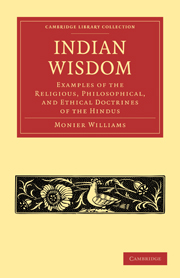Book contents
- Frontmatter
- PREFACE
- THE INDO-ROMANIC ALPHABET WITH THE EQUIVALENT SANSKṚIT LETTERS AND RULES FOR PRONUNCIATION
- Contents
- INTRODUCTION
- LECTURE I The Hymns of the Veda
- LECTURE II The Brāhmana Portion of the Veda
- LECTURE III The Systems of Philosophy
- LECTURE IV The Nyāya System of Philosophy
- LECTURE V The Sānkhya System of Philosophy
- LECTURE VI The Mimāṉsā System of Philosophy
- LECTURE VII Irregular Systems and Eclectic School
- LECTURE VIII Smṛiti. The Vedāngas
- LECTURE IX Smārta-sūtra. Gṛihya, ‘domestic rules’
- LECTURE X The Law-books. Mainu continued
- LECTURE XI Metrical Version of some of Manu's Moral and Religious Precepts
- LECTURE XII The Epic Poems
- LECTURE XIII The Mahā-bhārata
- LECTURE XIV The Epic Poems compared together and with Homer
- LECTURE XV The Artificial Poems
- INDEX
- ADDITIONS AND CORRECTIONS
- ORIENTAL WORKS
LECTURE VI - The Mimāṉsā System of Philosophy
Published online by Cambridge University Press: 29 August 2010
- Frontmatter
- PREFACE
- THE INDO-ROMANIC ALPHABET WITH THE EQUIVALENT SANSKṚIT LETTERS AND RULES FOR PRONUNCIATION
- Contents
- INTRODUCTION
- LECTURE I The Hymns of the Veda
- LECTURE II The Brāhmana Portion of the Veda
- LECTURE III The Systems of Philosophy
- LECTURE IV The Nyāya System of Philosophy
- LECTURE V The Sānkhya System of Philosophy
- LECTURE VI The Mimāṉsā System of Philosophy
- LECTURE VII Irregular Systems and Eclectic School
- LECTURE VIII Smṛiti. The Vedāngas
- LECTURE IX Smārta-sūtra. Gṛihya, ‘domestic rules’
- LECTURE X The Law-books. Mainu continued
- LECTURE XI Metrical Version of some of Manu's Moral and Religious Precepts
- LECTURE XII The Epic Poems
- LECTURE XIII The Mahā-bhārata
- LECTURE XIV The Epic Poems compared together and with Homer
- LECTURE XV The Artificial Poems
- INDEX
- ADDITIONS AND CORRECTIONS
- ORIENTAL WORKS
Summary
OUR next subject is the Mīmāṉsā of Jaimini, which is sometimes connected with the Vedānta, this latter being called the Uttara-mīmāṉsā or Brahma-mīmāṉsā—as founded on the Upanishads or latter part of the Vedas—while Jaimini's system is styled the Pūrva-mīmāṉsā or Karma-mīmāṉsā, as concerned with the Mantras and Brāhmaṇas only. It is more usual, however, to indicate the opposition of the two systems to each other by calling the one Mīmāṉsā and the other Vedānta. In fact, Jaimini's system, like the Yoga, cannot suitably be called a subdivision of any other system, for it is in real truth not a system of philosophy, but rather of ritualism. It does not concern itself, like the other systems, with investigations into the nature of soul, mind, and matter, but with a correct interpretation of the ritual of the Veda and the solutions of doubts and discrepancies in regard to Vedic texts caused by the discordant explanations of opposite schools. Its only claim to the title of a philosophy consists in its mode of interpretation, the topics being arranged according to particular categories (such as authoritativeness, indirect precept, &c.), and treated according to a kind of logical method, commencing with the proposition to be discussed, the doubt arising about it, the Pūrva-pahsha or primâ facie and wrong view of the question, the Uttara-paksha or refutation of the wrong view, and the conclusion. The main design of the whole system appears to be to make a god of ritualism.
- Type
- Chapter
- Information
- Indian WisdomExamples of the Religious, Philosophical, and Ethical Doctrines of the Hindus, pp. 108 - 126Publisher: Cambridge University PressPrint publication year: 2010First published in: 1875

